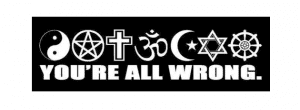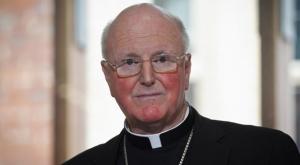The headlines last week said that 30% of Republicans believe that Obama is a Muslim. An actual increase since 2008. And this has been followed by various surveys (always publicized by self-proclaimed liberals) that conservatives are simply less intellectual, less smart, than liberals.
I doubt it. Read down in an article on the recent PEW foundation survey and the picture is murkier than ignorance rather than intelligence. (http://abcnews.go.com/blogs/politics/2012/07/half-of-americans-do-not-know-the-presidents-religion/)
Once of the surveyors suspects, given the data, that for Republicans the appellation “muslim” has simply become a way of expressing strong dislike. Of course that is reprehensible, but it isn’t stupid. Indeed it is pretty common to take a derogatory term from one realm of bigotry and broaden its usage to all realms of disapproval. Look at the use of the word “fundamentalist” by liberals.
A long time correspondent recently wrote me (yet again) a long fear-drenched email about the Muslim threat to America. It was interesting. It showed how she has come to conflate Islam, socialism, and homosexuality into a single target for her fears. When she uses the terms “muslim,” “socialist,” or “gay” she isn’t even consciously aware that they refer to distinct and sometime mutually exclusive phenomenon. They simply represent the vast “other” that she believes threatens her, her family, and her way of life.
One could do a long analysis of the world of political and social discourse in which this great conflation takes place. And one might usefully compare it to the way that early 20th century anti-semitism was carefully fostered in Europe. (Jews were simultaneously communists, capitalists, homosexuals, lascivious heterosexuals, and self-righteous puritans.) But this analysis won’t solve the problem.
Nor, as I have discovered, will careful articulation of actual differences backed by endless attention to facts.
Because the problem is fear. Fear doesn’t respond to facts, nor to reason. Nor (short years of psychotherapy) does it disappear when its origins are revealed.
Fear is nurtured in solitude, but dissipated in relationships. My correspondent spends too much time alone with the voices from the television conversing with the voices in her head. Email simply moves the conversation to a different screen. And those conversations, and very few others, simply join when her friends meet for lunch or coffee. Her society is simply the externalization and confirmation of her inner discourse.
She isn’t the only one. And she isn’t the only one desperately seeking someone or something who will break in and break open the conversation. Why else would she keep writing me, when she knows what I will say?
I am tempted to believe that an encounter with Christ, who casts away fears, might help. But alas the Jesus whom she meets in church confirms her fears rather than exorcising them. So the only cure left for the amorphous fear of the “other” is a human encounter that strips away the great conflation of fears and replaces it with a human face.
Those of us engaged in inter-religious dialogue often have high hopes for pluralistic societies and cooperation in resolving the great social problems of our age. Yet for now, and for perhaps the greatest number of Americans, we need an equally challenging but much less grandiose goal: ending the fear that gnaws away at our souls. And that will take as many face to face meetings between the fearful and the feared as our churches, mosques, synagogues, civil authorities, and civic organizations can organize.
Of course, from a Christian perspective this is the way you meet Jesus and let him cast out your fears, but to each his or her own theology. We need to meet our neighbors. Perhaps we won’t fear them. Perhaps we can even learn to love them.











